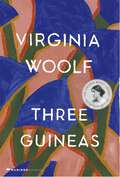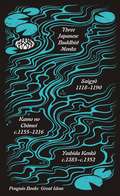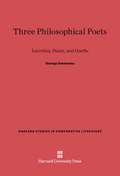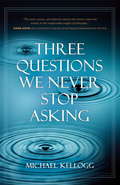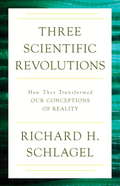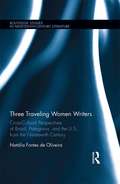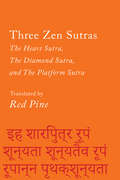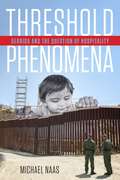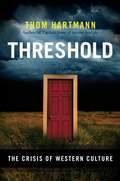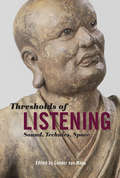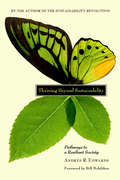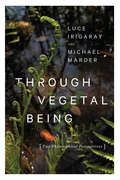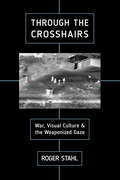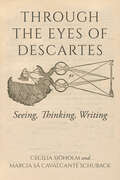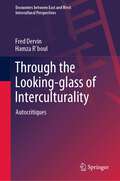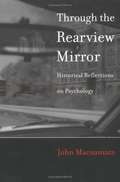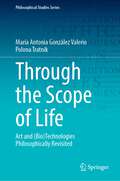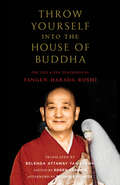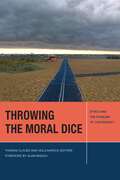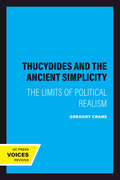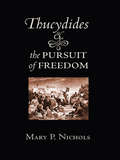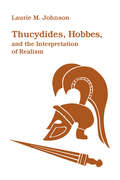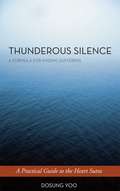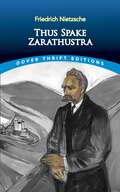- Table View
- List View
Three Guineas (Annotated): Large Print
by Virginia Woolf Jane Marcus Mark HusseyThree Guineas is written as a series of letters in which Virginia Woolf ponders the efficacy of donating to various causes to prevent war. In reflecting on her situation as the "daughter of an educated man" in 1930s England, Woolf challenges liberal orthodoxies and marshals vast research to make discomforting and still-challenging arguments about the relationship between gender and violence, and about the pieties of those who fail to see their complicity in war-making. This pacifist-feminist essay is a classic whose message resonates loudly in our contemporary global situation.Annotated and with an introduction by Jane Marcus
Three Japanese Buddhist Monks (Penguin Great Ideas)
by Saigyo Yoshida Kenko Kamo no Chomei'I have relinquished all that ties me to the world, but the one thing that still haunts me is the beauty of the sky'These simple, inspiring writings by three medieval Buddhist monks offer peace and wisdom amid the world's uncertainties, and are an invitation to relinquish earthly desires and instead taste life in the moment.One of twenty new books in the bestselling Penguin Great Ideas series. This new selection showcases a diverse list of thinkers who have helped shape our world today, from anarchists to stoics, feminists to prophets, satirists to Zen Buddhists.
Three Philosophical Poets: Lucretius, Dante, and Goethe
by George SantayanaThis book provides an introduction to the three great philosophical poets whose works taken together possibly sum up all European philosophy.
Three Questions We Never Stop Asking
by Michael KelloggFor anyone wishing to discover, or rediscover, philosophy in its original meaning--"the love of wisdom"--this engaging, clearly written, and accessible volume is an excellent place to start. What can I know? What may I hope? What ought I to do? These are three questions that--however much we immerse ourselves in the whirl and concerns of everyday life--we cannot, in the end, escape. They intrude themselves, not just in times of personal crisis, but at odd moments and in varied ways. Even those who are not inclined to the discipline of philosophy or even particularly reflective will feel their force on occasion. Whether we develop satisfactory answers or not, wrestling with such questions is part of what it is to be human. In this excellent introduction to the essential issues that have preoccupied philosophers throughout the centuries, the author provides fresh and engaging portraits of the greatest thinkers on each of these questions: Plato and Wittgenstein on the possibility of philosophical knowledge; Kant and Nietzsche on the existence of God; Aristotle and Heidegger on human virtue. The first member of the pair is a builder, the second a destroyer. One explores the promise of a theory, the other the consequences of its ruin. These juxtaposed pairs are not self?contained, however. All six thinkers are engaged in a dialogue with one another on issues that touch our lives directly and profoundly. As Nietzsche explained, "I live as if the centuries were nothing." The author has arranged them in an order that unveils an ever-deepening understanding of the moral, spiritual and intellectual space in which our lives unfold.
Three Scientific Revolutions
by Richard H. SchlagelScience has had a profound influence in shaping contemporary perspectives of reality, yet few in the public have fully grasped the profound implications of scientific discoveries. This book describes three intellectual revolutions that led to the current scientific consensus, emphasizing how science over the centuries has undermined traditional, religious worldviews.The author begins in ancient Greece, where the first revolution took place. Beginning in the sixth-century BCE, a series of innovative thinkers rejected the mythology of their culture and turned to rational analysis and the empirical study of reality. This change in thinking, though it lay dormant for the many centuries of Christian hegemony in the West, eventually gave rise to the Enlightenment of the 17th and 18th centuries--the second revolution. Highlighted by such luminaries as Kepler, Galileo, and Isaac Newton, the Enlightenment laid the foundations for our current understanding of the world.Today we live amidst the third scientific revolution, including Darwin's theory of evolution, Planck's concept of the quantum, Einstein's relativity theories, Bohr's quantum mechanics, along with Watson and Crick's decoding of the human genome with the prospect of improving human nature. Besides technological wonders, this revolution has also supported widespread respect for freedom of thought, greater educational opportunities, and democratic governments. Looking to the future, Schlagel sees many exciting possibilities yet also potentially devastating threats to the environment. He underscores the need for widespread scientific literacy, stressing that only unfettered scientific inquiry offers a realistic hope of overcoming these daunting challenges.From the Trade Paperback edition.
Three Traveling Women Writers: Cross-Cultural Perspectives of Brazil, Patagonia, and the U.S from the Nineteenth Century (Routledge Studies in Nineteenth Century Literature)
by Natália Fontes de OliveiraThis book presents an alternative framework for reading nineteenth century women’s travel narratives by challenging the traditional paradigms which often limit women’s space in print culture. For the first time, through a comparative lens, a Latin American woman’s travel narrative is analyzed concomitantly with the narratives of a North American and a European writer. Contrary to the common assumption that Latin American women were powerless victims of imperialism, elite women had access to the predominant philosophies of their time, traveled around the globe, and wrote about their experiences. This book examines how an Argentinian writer, together with an English and an American writer, manipulate their bourgeois identity to inhabit the male dominated sphere of print culture. By travelling and publishing travel narratives, the three traveling women writers search for empowerment to establish their authority as writers and shapers of knowledge in literature. Utilizing several concepts and criticisms, including Aristotle’s rhetoric, Foucault’s theories, travel writing criticism, postcolonial discourse, and feminist literary criticism; this volume attempts to challenge old-fashioned architypes and confinements of gender for traveling women writers in the nineteenth century.
Three Zen Sutras: The Heart, The Diamond, and The Platform Sutras (Counterpoints #7)
by Red PineThe three most venerated sutras of Zen in a true pocket-sized edition from a legendary practitioner and translator of Buddhist teachings.These three Sutras, often linked to form a trio of texts that have been revered and studied for centuries, are now available together in this single volume. Red Pine, whose acclaimed translations these particular Buddhist texts are considered canon, provides a sensitive and assured treatment of the classic triumvirate in a gift-sized volume, perfect for sharing with anyone seeking guidance and peace. The Heart Sutra, with its profound and wide-reaching influence on Buddhism, offers the Prajnaparamita teaching of emptiness. The Diamond Sutra, said to contain answers to all questions of delusion and dualism, outlines the bodhisattva path followed by the Buddha. And The Platform Sutra is an autobiography of Hui-neng, the controversial 6th Patriarch of Zen. His understanding of the fundamentals of a spiritual and practical life has served as the introduction to the teachings of Zen that students have been putting into practice for the past 1300 years.In addition to new translations of all three texts, Red Pine has included an introduction that ties all three together and just enough footnotes to explain what needs explaining but not enough to get in the way.
Threshold Phenomena: Derrida and the Question of Hospitality
by Michael NaasThreshold Phenomena reexamines Jacques Derrida’s thinking of hospitality, from his well-known writings of the 1990s to his recently-published seminars on the same topic. The book follows Derrida’s rereading of several central figures and texts on hospitality (Sophocles’ Oedipus at Colonus, Kant’s Perpetual Peace, Levinas’s Totality and Infinity) and his attempt to rethink questions surrounding not only private but also public hospitality in the form of immigration law, the contemporary treatment of migrants or stateless peoples, and the establishment of cities of asylum.Naas develops many of the central themes of Derrida’s seminar—the relationship between hospitality and teletechnology (telephone, internet, cyberspace, etc.), the role of fatherlands and mother tongues in hospitality, questions of purity, immunity, and xenophobia, and the possibility of extending hospitality beyond the human—to animals, plants, gods, and clones. Reframing Derrida’s approach to ethics, Naas reconsiders the relationship between hospitality and deconstruction, concluding that hospitality is not merely a theme to be treated by deconstruction but one of the best ways of describing its work. Naas’s book turns around a figure that Derrida himself returns to several times throughout the seminar: the threshold—a figure of hospitality par excellence, but also, in his seminars, another name for what Derrida in the 1960s began calling différance. Threshold Phenomena concludes that Derrida’s seminar on hospitality is one of the best introductions we have to Derrida’s work in general and one of the surest signs of its continuing relevance, a seminar that is at once fascinating and engaging in its own right and necessary for analyzing today’s increasingly nationalistic and xenophobic political climate.
Threshold: The Crisis of Western Culture
by Thom HartmannFrom the book jacket: As the first decade of the twenty-first century closes amid economic collapse and the seeming ruin of the American Dream, Thom Hartmann's Threshold could not be more relevant. We've reached a moment of cultural reckoning. If we are to make progress toward a more stable future-- not just economically, but culturally and environmentally-- it will require a paradigm shift, an evolution in mainstream thinking.
Thresholds of Listening: Sound, Technics, Space
by Sander Van MaasThresholds of Listening addresses recent and historical changes in the ways listening has been conceived. Listening, having been emancipated from the passive, subjected position of reception, has come to be asserted as an active force in culture and in collective and individual politics.The contributors to this volume show that the exteriorization of listening— brought into relief by recent historical studies of technologies of listening—involves a re-negotiation of the theoretical and pragmatic distinctions that underpin the notion of listening. Focusing on the manifold borderlines between listening and its erstwhile others, such as speaking, reading, touching, seeing, or hearing, the book maps new frontiers in the history of aurality. They suggest that listening’s finitude— defined in some of the essays as its death or deadliness—should be considered as a heuristic instrument rather than as a mere descriptor.Listening emerges where it appears to end or to run up against thresholds and limits—or when it takes unexpected turns. Listening’s recent emergence on the cultural and theoretical scene may therefore be productively read against contemporary recurrences of the motifs of elusiveness, finitude, and resistance to open up new politics, discourses, and technologies of aurality.
Thriving Beyond Sustainability
by Andres R. Edwards Bill MckibbenEvery fifteen seconds on our Earth, a child dies from waterborne disease. Three times an hour, another species becomes extinct. Each day we consume eighty-five million barrels of oil and pump twenty-three million tons of carbon dioxide into an already warming atmosphere. But against this bleak backdrop, beacons of hope shine from thousands of large and small initiatives taking place everywhere from isolated villages to major urban centers.Thriving Beyond Sustainability draws a collective map of individuals, organizations, and communities from around the world that are committed to building an alternative future--one that strives to restore ecological health; reinvent outmoded institutions; and rejuvenate our environmental, social, and economic systems. The projects and initiatives profiled are meeting the challenges of the day with optimism, hope, and results, leading the way in: Relocalization Green commerce Ecological design Environmental conservation Social transformation Overflowing with inspiration, the stories and ideas in these pages will cause the most chronic pessimist to see the glass as half full--to move beyond a perception of surviving with scarcity to one of flourishing with abundance. The comprehensive resource section provides the tools for everyone to become a catalyst for change.Andres R. Edwards is the author of The Sustainability Revolution, which has sold over twenty thousand copies. He is an educator, media designer, LEED-accredited green building and sustainability consultant, and the founder of EduTracks, a firm specializing in developing education programs and providing consulting services on sustainable practices.
Through Vegetal Being: Two Philosophical Perspectives (Critical Life Studies)
by Luce Irigaray Michael MarderBlossoming from a correspondence between Luce Irigaray and Michael Marder, Through Vegetal Being is an intense personal, philosophical, and political meditation on the significance of the vegetal for our lives, our ways of thinking, and our relations with human and nonhuman beings. The vegetal world has the potential to rescue our planet and our species and offers us a way to abandon past metaphysics without falling into nihilism. Luce Irigaray has argued in her philosophical work that living and coexisting are deficient unless we recognize sexuate difference as a crucial dimension of our existence. Michael Marder believes the same is true for vegetal difference.Irigaray and Marder consider how plants contribute to human development by sustaining our breathing, nourishing our senses, and keeping our bodies and minds alive. They note the importance of returning to ancient Greek tradition and engaging with Eastern teachings to revive a culture closer to nature. As a result, we can reestablish roots when we are displaced and recover the vital energy we need to improve our sensibility and relation to others. This generative discussion points toward a more universal way of becoming human that is embedded in the vegetal world.
Through the Crosshairs: War, Visual Culture, and the Weaponized Gaze (War Culture)
by Roger StahlNow that it has become so commonplace, we rarely blink an eye at camera footage framed by the crosshairs of a sniper’s gun or from the perspective of a descending smart bomb. But how did this weaponized gaze become the norm for depicting war, and how has it influenced public perceptions? Through the Crosshairs traces the genealogy of this weapon’s-eye view across a wide range of genres, including news reports, military public relations images, action movies, video games, and social media posts. As he tracks how gun-camera footage has spilled from the battlefield onto the screens of everyday civilian life, Roger Stahl exposes how this raw video is carefully curated and edited to promote identification with military weaponry, rather than with the targeted victims. He reveals how the weaponized gaze is not only a powerful propagandistic frame, but also a prime site of struggle over the representation of state violence.
Through the Eyes of Descartes: Seeing, Thinking, Writing (Studies in Continental Thought)
by Cecilia Sjöholm Marcia Sá Schuback"I shall here present my life," writes Descartes in Discourse on Method, "as in a painting" and my method "as a fable." Through the Eyes of Descartes demonstrates how a Cartesian aesthetics is interwoven in his thought. It brings together a variety of materials: his metaphysical writings and essays in natural philosophy, through to his letters, drawings, and printed images.Cecilia Sjöholm and Marcia Sá Cavalcante Schuback seek to bring Descartes into dialogue with contemporary phenomenology as well as contemporary psychoanalytic thought. They focus on how perception interacts with emotions and thought, and the way in which our gaze is directed toward limit-phenomena of beauty and fascination.In Through the Eyes of Descartes, Cecilia Sjöholm and Marcia Sá Cavalcante Schuback counter the traditional picture of Descartes by presenting his work in an entirely different light: a Descartes of the arts, of sensibility, of inner images, and of imagination.
Through the Looking-glass of Interculturality: Autocritiques (Encounters between East and West)
by Fred Dervin Hamza R'boulThis book starts from the premise that honest and constructive dialogue between scholars and educators of interculturality, especially from different geopolitical spheres, is needed more than ever. The book is about the important and yet contested notion of interculturality—a notion used in different fields of research. It was co-written by two scholars who have never met before and who got to know each other intellectually and personally in the process of writing this book, using interculturality as a looking-glass. (Re-)negotiating meanings, ideologies and their own identities in writing the chapters together, the authors enter into multifaceted dialogues and intercommunicate, sharing while accepting disagreements. The co-authors’ different profiles in terms of geography, generation, status, preferred paradigms and multilingual identity (amongst others) are put forward, confronted, and mirrored in the different chapters, leading to the joint negotiation of aspirations concerning interculturality in communication and education. While describing their current takes on interculturality they also conduct autocritiques of their past and present engagement with the notion. The following questions are also addressed: Who is talking the most about interculturality in the world today? Whose voices are not heard? How to disrupt current hegemonies around the notion for real? And how to promote epistemological plurality in the discourses and narratives shaping our understandings of the notion? Autocritiquing is proposed as a way of unthinking and rethinking interculturality ad infinitum. This book argues that engaging with the notion requires constant self-reflection, examining one’s positionality and intersectionality, listening to the voices that one projects onto the world of, e.g., research and education, and operating transformations in one’s thinking, trying out new paradigms, ideologies and methods.
Through the Rearview Mirror: Historical Reflections on Psychology
by John MacnamaraJohn Macnamara shows how a number of important thinkers through the ages have approached problems of mental representation and the acquisition of knowledge.
Through the Scope of Life: Art and (Bio)Technologies Philosophically Revisited (Philosophical Studies Series #153)
by Polona Tratnik María Antonia González ValerioThis book offers intriguing philosophical inquiries into biotechnological art and the life sciences, addressing their convergences as well as their epistemic and functional divergences. Rooted on a thorough understanding of the history of philosophy, this work builds on critical and ontological thought to interpret the concept of life that underscores first-hand dealings with matter and experimentation. The book breaks new ground on the issue of animality and delivers fresh posthumanist perspectives on the topics addressed. The authors embark on a deep ontological probe of the concept of medium as communication-bridging and life-bearing. They also take on the concept of performativity as biotechnological art.The book includes concrete, well-documented case studies and shows how certain narratives and practices directly impact ideas surrounding science and technologies. It will interest philosophers in art and technology, aesthetics, ontology, and the life sciences. It will also engage art practitioners in art and science, curators and researchers.
Throw Yourself into the House of Buddha: The Life and Zen Teachings of Tangen Harada Roshi
by Tangen HaradaFrom narrowly surviving World War II through enduring the profound rigors of traditional Zen training, Tangen Harada&’s fascinating life story and teachings present a classic picture of the Buddhist journey from suffering to realization.On August 15, 1945, at the age of twenty, Tangen Harada stood on an airfield and prepared to board the airplane on which he would undertake a suicide mission for his country. Only the voice of Emperor Hirohito on the radio—never before heard by the Japanese public—announcing Japan&’s surrender saved his life. After returning from a Soviet POW camp in 1946, overcome with questions about the meaning of human life and suffering, Harada sought out the counsel of a Zen master. He thus embarked on the path of awakening and liberation to which he would commit the rest of his life, eventually teaching thousands of people from around the world. Throw Yourself into the House of Buddha includes Tangen Roshi&’s life story in his own words, as well as twenty-four teachings conveying the heart of his Zen understanding. Each chapter, paired with a beautiful calligraphy by the master, conveys his direct, uncompromising, yet encouraging message about the possibility of Zen realization. &“Wake up,&” writes Harada, &“and you can say for yourself, &‘The sun is my eye, the wind my breath, all of space my heart, the mountain and ocean my body. The sun shining brightly, vividly, is the eye of my life. The vastness of the sky is my heart.&’ Who is the master of this boundless heart? No one else but you. This is your reality. Heaven and earth—same root, all things—one body.&”
Throwing the Moral Dice: Ethics and the Problem of Contingency (Just Ideas)
by Thomas Claviez and Viola MarchiMore than a purely philosophical problem, straddling the ambivalent terrain between necessity and impossibility, contingency has become the very horizon of everyday life. Often used as a synonym for the precariousness of working conditions under neoliberalism, for the unknown threats posed by terrorism, or for the uncertain future of the planet itself, contingency needs to be calculated and controlled in the name of the protection of life. The overcoming of contingency is not only called upon to justify questionable mechanisms of political control; it serves as a central legitimating factor for Enlightenment itself. In this volume, nine major philosophers and theorists address a range of questions around contingency and moral philosophy. How can we rethink contingency in its creative aspects, outside the dominant rhetoric of risk and dangerous exposure? What is the status of contingency—as the unnecessary and law-defying—in or for ethics? What would an alternative “ethics of contingency”—one that does not simply attempt to sublate it out of existence—look like?The volume tackles the problem contingency has always posed to both ethical theory and dialectics: that of difference itself, in the difficult mediation between the particular and the universal, same and other, the contingent singularity of the event and the necessary generality of the norms and laws.From deconstruction to feminism to ecological thought, some of today’s most influential thinkers reshape many of the most debated concepts in moral philosophy: difference, agency, community, and life itself.Contributors: Étienne Balibar, Rosi Braidotti, Thomas Claviez, Drucilla Cornell, Hans Ulrich Gumbrecht, Viola Marchi, Michael Naas, Cary Wolfe, Slavoj Žižek
Thucydides and the Ancient Simplicity: The Limits of Political Realism
by Gregory CraneThucydides' History of the Peloponnesian War is the earliest surviving realist text in the European tradition. As an account of the Peloponnesian War, it is famous both as an analysis of power politics and as a classic of political realism. From the opening speeches, Thucydides' Athenians emerge as a new and frightening source of power, motivated by self-interest and oblivious to the rules and shared values under which the Greeks had operated for centuries. Gregory Crane demonstrates how Thucydides' history brilliantly analyzes both the power and the dramatic weaknesses of realist thought. The tragedy of Thucydides' history emerges from the ultimate failure of the Athenian project. The new morality of the imperialists proved as conflicted as the old; history shows that their values were unstable and self-destructive. Thucydides' history ends with the recounting of an intellectual stalemate that, a century later, motivated Plato's greatest work. Thucydides and the Ancient Simplicity includes a thought-provoking discussion questioning currently held ideas of political realism and its limits. Crane's sophisticated claim for the continuing usefulness of the political examples of the classical past will appeal to anyone interested in the conflict between the exercise of political power and the preservation of human freedom and dignity.
Thucydides and the Pursuit of Freedom
by Mary P. NicholsIn Thucydides and the Pursuit of Freedom, Mary P. Nichols argues for the centrality of the idea of freedom in Thucydides' thought. Through her close reading of his History of the Peloponnesian War, she explores the manifestations of this theme. Cities and individuals in Thucydides' history take freedom as their goal, whether they claim to possess it and want to maintain it or whether they desire to attain it for themselves or others. Freedom is the goal of both antagonists in the Peloponnesian War, Sparta and Athens, although in different ways. One of the fullest expressions of freedom can be seen in the rhetoric of Thucydides’ Pericles, especially in his famous funeral oration. More than simply documenting the struggle for freedom, however, Thucydides himself is taking freedom as his cause. On the one hand, he demonstrates that freedom makes possible human excellence, including courage, self-restraint, deliberation, and judgment, which support freedom in turn. On the other hand, the pursuit of freedom, in one’s own regime and in the world at large, clashes with interests and material necessity, and indeed the very passions required for its support. Thucydides’ work, which he himself considered a possession for all time, therefore speaks very much to our time, encouraging the defense of freedom while warning of the limits and dangers in doing so. The powerful must defend freedom, Thucydides teaches, but beware that the cost not become freedom itself.
Thucydides on Politics
by Geoffrey HawthornThucydides famously declared his work to be 'a possession for all time', and so it has proved to be, as each age and generation has seen new things to admire in it and take from it. In the last hundred years, Thucydides has been interpreted and invoked in support of many different positions in politics, political theory and international relations. Geoffrey Hawthorn offers a new and highly original reading, one that sees him as neither simply an ancestor nor a colleague but as an unsurpassed guide to a deeper realism about politics. In this account, Thucydides emerges as sensitive to the non-rational and the limits of human agency, sceptical about political speech, resistant to easy generalisations or theoretical reductions, and opposed to any practical, moral or constitutional closure in politics. The book will be of interest to students of politics and classics.
Thucydides, Hobbes, and the Interpretation of Realism
by Laurie M. JohnsonThis original book has been consistently cited by scholars of international relations who explore the roots of realism in Thucydides's history and the political philosophy of Thomas Hobbes. While acknowledging that neither thinker fits perfectly within the confines of international relations realism, Laurie M. Johnson proposes Hobbes's philosophy is more closely aligned with it than Thucydides's.
Thunderous Silence
by Dosung YooThunderous Silence throws light on the Heart Sutra--a pithy encapsulation of the essence of Perfection of Wisdom literature--using stop-by-step analysis and an easy, conversational voice. Dosung Yoo examines the sutra phrase by phrase, using rich explanations and metaphors drawn from Korean folklore, quantum physics, Charles Dickens, and everything in between to clarify subtle concepts for the reader. This book invites us to examine the fundamentals of Buddhism--the Four Noble Truths, emptiness, enlightenment--through the prism of the Heart Sutra. Both those new to Buddhism and longtime practitioners looking to revisit a core text from a fresh perspective will find this work appealing.
Thus Spake Zarathustra: A Book For All And None (Dover Thrift Editions: Philosophy)
by Friedrich NietzscheA tremendously influential philosophical work of the late nineteenth century, Thus Spake Zarathustra is also a literary masterpiece by one of the most important thinkers of modern times. In it, the ancient Persian religious leader Zarathustra (or Zoroaster) serves as the voice for Friedrich Nietzsche's views, which include the introduction of the controversial doctrine of the Übermensch, or "superman." Although later perverted by Nazi propagandists, the Übermensch was conceived by Nietzsche to designate the ultimate goal of human existence as the achievement of greatness of will and being. He was convinced that the individual, instead of resigning himself to the weakness of being human and worshipping perfection only possible in the next world (at least in the Christian view), should try to perfect himself during his earthly existence, and transcend the limitations of conventional morality. By doing so, the Übermensch would emerge victorious, standing in stark contrast to "the last man" -- an uncreative conformist and complacent hedonist who embodies Nietzsche's critique of modern civilization, morality, and the Christian religion. Written in a passionate, quasi-biblical style, Thus Spake Zarathustra is daring in form and filled with provocative, thought-provoking concepts. Today, the work is regarded as a forerunner of modern existentialist thought, a book that has provoked and stimulated students of philosophy and literature for more than 100 years.
